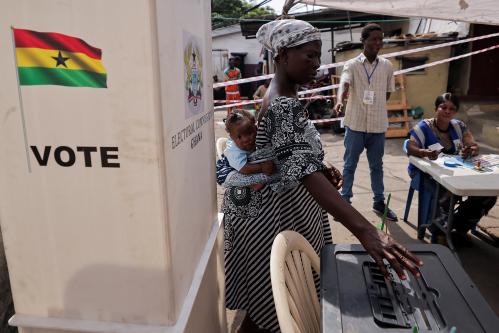

11:15 am EDT - 12:45 pm EDT
Past Event
11:15 am - 12:45 pm EDT
1818 H Street N.W.
Washington, DC
20433
By: Amar Bhattacharya and Homi Kharas
An informal roundtable to discuss the role of the World Bank Group (WBG) in the new global development agenda was held at the World Bank on October 7, 2016. Jointly sponsored by Brookings and the G-24, the roundtable brought together senior policymakers, World Bank officials and academics in Washington-based think-tanks.
Several recent papers address the role of the World Bank in the new global agenda, including the “Forward Look: A Vision for the World Bank Group in 2030” document prepared by the World Bank Group for the Development Committee meeting. The Center for Global Development’s High Level Panel report on multilateral development banks, the New Climate Economy report “The Sustainable Infrastructure Imperative”, and the report of the International Commission on Financing Global Education Opportunity “The Learning Generation”. A background brief prepared by Brookings scholars was also shared with roundtable participants.
The reports have a common theme—they each lay out an imperative to scale up actions on the new global agenda with multilateral banks at the heart of implementation.
Rapid growth in developing countries, and for the poorest countries, may be over. Headwinds of falling commodity prices, slow trade growth, rising risk premiums and political uncertainties all over the world suggest that rapid growth in future will be harder to sustain.
This environment makes the pursuit of the 2030 development agenda—and the attainment of the sustainable development goals—more daunting but not out of reach. At the same time, investments made over the next 20 years will lock the world into patterns of consumption and production from which it will be hard to escape and which will have a defining impact on the climate goals agreed in Paris. The shape and sustainability of the global economy will be determined by the infrastructure investments made in the next two decades. Getting it right will be a win-win for the world—good for climate mitigation and for global and national growth.
The anticipated financing needs to deliver on the 2030 development agenda are large across all country groups. In addition, there will be substantial financing requirements for global public goods. Development finance institutions like the World Bank Group have a comparative advantage in mobilizing financing from all sources and enhancing the impact of their use. They can also bring down the cost of capital for social investments and for infrastructure, for example, from 8 or 9 percentage points to 3 or 4 points.
It might be able to have greater catalytic impact through policy and institutional support and by mobilizing greater amounts of private capital.
However, it does not follow that because there are large investment needs in the developing world that it is the role of the World Bank Group to provide the funds. It might be able to have greater catalytic impact through policy and institutional support and by mobilizing greater amounts of private capital.
A shared vision based on implementation of the SDGs, and the need for a more efficient and better functioning World Bank Group was broadly held. This vision included: the WBG should remain a premier global development institution; it should engage with all its clients and member countries (low-income, middle-income and high-income); it should allocate resources strategically; it should pay special attention to small states and fragile and conflict affected states.
Participants disagreed on (i) the right size for the WBG; (ii) the nature and level of activity in upper middle-income countries; and (iii) the nature of the best type of instruments, specifically budget support.
In this vein, while there was consensus that if the MDBs did not exist they would have to be invented today, participants also urged for changes to make the WBG better fit-for-purpose. They noted that MDBs were underperforming in terms of development impact and could reallocate resources to good effect.
Right-sizing the World Bank Group: While acknowledging large needs especially in human development, resilient agriculture, sustainable infrastructure, crisis-response, global public goods and fragile states, there were a range of views about the magnitude of financing needs that should come from the WBG. There has been little effort to look more broadly at the multilateral development bank system, including all agencies, and to derive from that a role for the WBG according to its comparative advantage, especially in light of shifting capabilities of regional development banks and the potential contribution of the private sector.
Allocation of resources: There is agreement that greater support should be extended to low and lower middle-income countries. Discussions on a scaled-up IDA are well advanced with broad recognition that IDA should focus on low income countries and fragile environments while also paying attention to countries graduating to IBRD. But the details on what this means in practice for IBRD and IFC are not resolved. Some pushed for far more IBRD and IFC resources to flow to low-income countries, including through blended finance. Others advocated for substantially higher quantitative targets for IBRD lending to LMICs, observing that the high share of IBRD lending to countries with income levels above a suggested threshold (currently about $7000 GNI per capita) was inappropriate. Others called for a strict separation between concessional and non-concessional financing, with agreed allocations for concessional financing but a more flexible approach to non-concessional flows. Still others argued that income per capita was an inappropriate metric and called for a broader beyond-GDP discussion of ex ante allocation criteria.
At the same time as country allocations were debated, alternative allocation criteria were also proposed. Ability to contribute to a scaled up development agenda, especially in the focus areas identified in the Addis Ababa Agenda for Action. Ability to mobilize or catalyze private finance could be another criterion. What is important is to keep optimization of development impact in the foreground.
(The important role of the WBG in crisis response situations was widely acknowledged. Any lending under such windows should, however, be kept separate from any ex ante country allocation that WBG management might make.)
Instruments: The WBG in particular disburses considerable sums for structural reform, but the link to development outcomes of such reforms is indirect, and difficult to quantify. This makes it difficult to apply in practice ex ante allocation approaches based on maximizing development outcomes. At the same time, the business model for recouping costs incurred in developing scalable financing platforms—potentially a high impact intervention—is not yet well developed. Instrumentality is important as without a sense of how funds will be spent it is difficult to make a case for expanding the volume of funds.
As agreement on a scaled-up IDA is reached, there is a need to define the role of IBRD and IFC in low income countries and fragile situations.
Managing the transition out of IDA needs to ensure an adequate volume and quality of support for LMICs.
A better understanding of the development needs of UMICs is needed, along with the recognition of their contribution to the learning and knowledge of the WBG. Consequently, the nature and scale of the WBG’s role in middle income countries, including impact on global spillovers, remains undecided.
The process for engagement with shareholders of middle income countries on the role of the WBG in meeting their development needs should be strengthened.
The process for engagement with shareholders of middle income countries on the role of the WBG in meeting their development needs should be strengthened. Middle-income countries are generally supportive of the idea of a large WBG that responds to their needs, but have not yet articulated their views on some of the trade-offs that might be needed.
Additional substantive dialogue is needed on how to finance global public goods and the strategic role to be played by the WBG in providing them. For example, is it more efficient for the WBG to fund the Consultative Group for International Agricultural Research, or should donors do this directly themselves?
More work is needed on the portfolio diversification benefits of lending to UMICs. (Or would a diversified pool of LMICs be sufficient to manage risk?)
More work and further deliberations are needed on optimizing MDB balance sheets—both by better matching of shareholder contributions to IDA with flows of IDA grants and loans, and capital optimization of IBRD and IFC.
Accountability of the WBG management and shareholders could be strengthened.
IBRD, IDA and IFC may be able to find joint solutions to specific development problems, using the comparative advantage of each.

Amar Bhattacharya, Homi Kharas, Charlotte Rivard, Eleonore Soubeyran
June 30, 2025

Homi Kharas
June 30, 2025

Oscar Otele, Danielle Resnick, Landry Signé
June 25, 2025